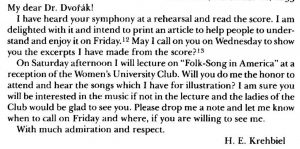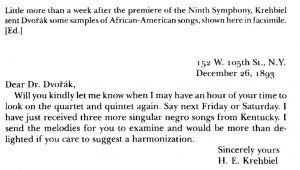Antonín Dvorak is one of the most famous musical composers of all time. His New World Symphony pushed the boundaries of what was considered classical music both during and after his lifetime (1841-1904). Dvorak’s borrowing and incorporation of traditional Native American and African American tunes into his Ninth Symphony sparked quite the controversy across the United States around the time that he moved to Spillville, Iowa in 1893. A large and public debate sparked across the country of the validity of incorporating African American spirituals and traditional Native American songs and influences into Western classical music.
With this controversy came an equal distribution of critics and fans of Dvorak’s music. Notably, famous music critic and reviewer Henry Krehbiel sent Dvorak a number of written correspondences which are very important because “they prove that Krehbiel’s article on the [ninth] symphony, which appeared on 15 December 1893 in the New York Tribune, was based on a lengthy interview with the composer,” (Beckerman).
The letters read as follows:
Interestingly, although we have not read the Krehbiel interview on Dvorak’s Ninth Symphony from the New York Tribune for class, we have read another one of his writings for class on October 6, 2022: an excerpt from his book “Afro-American Folksongs; A Study in Racial and National Music”. In this chapter, Krehbiel used racist and problematic language such as “savage” and “primitive” to refer to African Americans and their music on pages 11 and 13 (Krehbiel).
This is quite interesting in contrast to Krehbiel’s letters to Dvorak which praise Dvorak’s Ninth Symphony and call it “beautiful”, which is based on the very music that Krehbiel marked as “primitive” and “savage” twenty-one years later in 1914. I wonder if Krehbiel was hiding his true feelings about Black American music to Dvorak because Krehbiel was a fan of his Ninth Symphony and wanted to appeal to him as a friend and colleague? Or did Krehbiel like Dvorak’s quotations of Black American music despite the fact that he thought Black American music was “primitive” and “savage”?
The above correspondence from Krehbiel insinuates that Krehbiel has a passion for collecting scores and parts of African American songs, and furthermore studying them. The fact that Krehbiel relays to Dvorak that this music is even worthy of such deep study and collection raises some further questions in relation to the language Krehbiel uses in his book and his true intentions to network with Dvorak.
Krehbiel seems to have an interesting relationship to the music of Black Americans. He collects and studies it, but through a lens of white supremacy and racial othering. It also seems as though Krehbiel may have flexed his opinions on African American music to appeal more to Dvorak since Dvorak was so popular. Krehbiel likely found a useful connection in Dvorak, especially for the opportunity for Dvorak appear at his seminars (such as the one at the Women’s University Club) to make him seem established and well-connected. All of this being said, Krehbiel was an early advocate and promoter of Black American music, which cannot be said for everyone at the time.
Sources:
Dvorák and His World, edited by Michael Beckerman, Princeton University Press, 1993. ProQuest Ebook Central, https://ebookcentral.proquest.com/lib/stolaf-ebooks/detail.action?docID=3030296.
Krehbiel, Henry Edward. “Chapter 1: Folksongs in General.” Afro-American Folk Songs: A Study in Racial and National Music, Kessinger Publishing, Whitefish, MT, 2010, pp. v-28.






